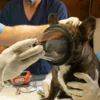
Soft Tissue Surgery
The soft tissue service at The City Vet Clinic performs surgeries to treat an extensive range of conditions in cats, dogs, and other companion animals. Our qualified veterinary surgeons perform modern surgical procedures, including minimally-invasive surgery, laser, respiratory tract, gastrointestinal, endocrine, and even reconstructive surgery.
The following could be a summary of the more common procedures that we perform. If you do not see a procedure listed, please call us for more information.
Neutering (spay and castration)
Abdominal Surgeries (gastrointestinal, urogenital system)
Thoracic Surgeries (diaphragmatic hernia etc.)
Upper Respiratory Tract Surgeries (brachycephalic airway syndrome)
Ophthalmology Surgeries (“cherry eye” pocket technique, entropion/ectropion correction)
Neck & Ear Surgeries (salivary gland excision, total ear canal ablation)
Wound Care and Reconstruction (skin trauma management, grafts)
Surgical Oncology (lump removal and biopsy)
Cryosurgery
Why would my pet need soft tissue surgery?
Veterinary soft tissue surgery is suggested for a range of reasons. The most common soft tissue surgeries are spay & neuter procedures, hernia repairs, and mass removals for companion pets and other animals. Your pet may require other complex and advanced soft tissue surgeries, such as cystotomy, exploratory surgery, and splenectomy, among others.
What should I expect for the surgery?
Pre-Operative Consultation: Like all surgeries, a pre-operational consultation is imperative to confirm your pet’s requirements are met to the most specific ability. During these visits, it’ll be your opportunity to ask your vet about your concerns and questions and achieve the maximum amount of insight possible to secure your furry companion’s comfort during and after the surgery.
Because a series of soft tissue surgeries are being performed in a veterinary clinic, each condition encompasses a unique surgical procedure and expertise from a skilled surgeon.
As a result, each specialist needs to fulfill a distinct role, and your pet must be comfortable enough to facilitate a smooth operation. Moreover, the vet is ready to monitor your pet’s pain tolerance and assess any complications pre and post-operation.
How do you look after my pet during surgery?
Our veterinarians adhere to the very best of care for all surgical procedures. In addition, our highly skilled surgeons emphasize pain management to make sure that your pet is safe and comfortable throughout the surgery process. Ensuring our patient’s comfort and safety during the entire procedure is the ultimate goal and a necessary component of our pet’s care.
Surgical Instructions
Surgeries are scheduled mostly every day or depending upon availability.
Drop off is observed mainly between 8:30 AM – 9:30 AM. Special arrangements can be made depending on the time and availability of the surgeon.
There is no solid food after midnight or the night before the surgery day, but water is fine unless previously directed otherwise by the doctor. Fasting procedures for animals should be observed for at least 8-10 hours.
Rabbits do not need to fast. However, please bring some hay and food as they need to eat right away during recovery.
Owners with diabetic pets are advised to ask the vet ahead of time about special instructions about food and insulin administration during the surgery day.
On the day of the surgery, the admission time usually takes at least 15 minutes; the admitting vet will discuss the surgical procedure and will ask to complete all pre-surgical paperwork. If someone apart from the patient’s owner is dropping off the pet, please ensure that person is authorized to make medical decisions, or you may call ahead to complete the necessary consent via phone.
Occasionally, the doctor may contact the owner regarding medical decisions intra-operatively or any untoward circumstances that may arise. Please confirm that correct contact information is provided at check-in to reach you in such an incident.
Post-Surgery
After the surgery, our nurses will monitor the patient until it’s fully awake. After the pet is conscious and has been examined, the veterinarian or a veterinary nurse will call the owner to inform of the patient’s status and pick-up time. In most cases, a pet will be discharged on the same day of the surgery. Still, in some cases, like for orthopedic surgeries or advanced procedures, the veterinarian will recommend that the pet be hospitalized for some time for additional monitoring.
Cost of Surgical Procedures
The surgery costs may vary widely depending on the type of procedure to be performed, the pet’s age, size, and general health condition of the pet. Our vets are happy to provide a written estimate before any procedure upon request or during pre-operative consultations.
PRE-OPERATIVE BLOOD TEST
Please take note that our routine neutering packages already include pre-operative blood examination.



Add comment